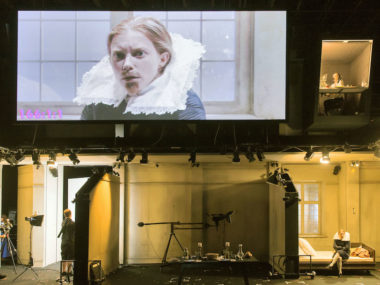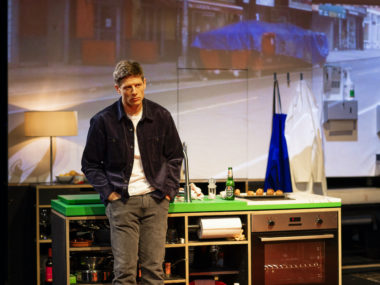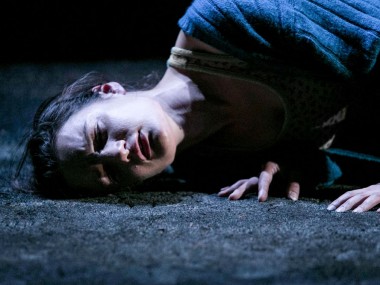little scratch, New Diorama Theatre
Friday 14th April 2023

The popularity of plays that feature trauma is certainly a trend in British theatre today. But is this a good thing? On the one hand, staging stories of sexual assault might offer consolation to other victims: you are not alone; we understand your experiences. On the other hand, these themes can be triggering, creating an unsafe atmosphere in which any warning is inadequate. little scratch (deliberately styled in lower case) is adapted by Miriam Battye from Rebecca Watson’s 2020 debut novel, and was first staged at the Hampstead Theatre in 2021. It now transfers, with a slight cast change, to the New Diorama.
Directed by Katie Mitchell, little scratch is a classic trauma story with a superbly theatrical staging. The plot is a day in the life of an unnamed young woman, who lives in London, from the moment she wakes up with a hangover to the moment she falls asleep. She showers, brushes her teeth, applies make-up, travels to her office by tube, greets work colleagues, watches the world of journalists working, does her admin duties as an assistant, meets her boyfriend, eats chips with him, has sex and then falls asleep. It is the story of everyday routines, of the daily alienation of the sleep/eat/go to toilet/work/sleep repeat world.
Except that it isn’t. As the narrator articulates her quotidian thoughts, the memory of her recent rape, by her boss who she sees at work almost every day, keeps resurfacing, although she does her best to keep this trauma repressed. Instead of telling anybody, neither boyfriend nor mum, neither work colleague nor police, she compulsively scratches the back of her knee, till she bleeds, then picks at the scabs, then tries to hide the traces of this self-harm. This is both psychologically realistic, and compelling. It is also a strong metaphor: you might call self-harm a little scratch, or try to downplay sexual assault, but this play will put you right.
The narrator scrambles for a seat on the tube, has awkward interactions with other women in the work toilet, books a flight for her boss, finds a strange note on lined paper in a bin, eats soup for lunch, and keeps checking WhatsApp messages on her phone, but all the time there is a danger of intrusive memory. She rehearses telling her boyfriend about her assault, but somehow can’t find the moment. Watson’s book, which appears on the page like a modernist poem, with snatches of thoughts running parallel to each other, using repeats and other literary typographic devices, gives a powerful sense of surviving trauma.
The effect of trauma, and the desire of the victim to downplay the experience — she says that at least she hasn’t been murdered, or imprisoned in a basement — leads also to the sense that she doesn’t want to fully acknowledge what has happened because it will change everything about her life for ever. It will, she thinks, affect having sex with her boyfriend; it will separate her from her previous life. So her refusal to speak about her assault is not only a refusal to come out as a victim, but also a way of keeping her sense of self intact. Why should everything have to change — I didn’t have agency when I was attacked, but I do now.
Although unnamed, the narrator is a would-be writer, who — ironically since this story is a book and a play — cannot get back to her novel after her assault, so the quick perceptions, wry jokes and occasional flourishes of her thinking feel realistic and right. Likewise, Battye’s adaptation is faithful to the original, with its split consciousness represented by four actors, who speak the words at microphones, and create Foley sound effects using props like brushes, cups of water or crisp packets. The cast — Eleanor Henderson, Rebekah Murrell, Eve Ponsonby, and Ragevan Vasan — wear dark clothes and perform the words as if they are playing a 90-minute musical quartet.
There is something fascinating about hearing the different thoughts of the narrator, sometimes in harmony, sometimes in conflict, as she argues with herself, like we all do. The sense of counterpoint, of liveness in thinking, of painful memories and compulsions barely under control ripples through the show. Mitchell’s direction perfectly complements the text, and the production’s minimalism allows the words, beautifully voiced by all the actors, to take center stage. There is a strong sense of stillness, complemented by Melanie Wilson’s sound score, which gives the narrator’s individual experience a grander resonance.
The effect of four voices overlapping, contradicting, complementing, asserting and lapsing into silence recalls Sarah Kane’s Crave and her 4.48 Psychosis, while the absence of a set designer and any movement by the actors focuses attention on the narrator’s thoughts and feelings, rather than on her body. So humour, such as the “plop” of a turd into the toilet bowl or the satire on the poetry reading she goes to, mixes with dread, as she worries about being harassed in the street or the lift by random men. All this comes across strongly. It’s a gripping production which subtly suggests, without being explicit, issues such as our sexualized culture, our drinking culture and our patriarchal work culture. But more than anything else it puts us right inside the head of a trauma survivor. It’s uncomfortable, but real.
This review first appeared on The Theatre Times




